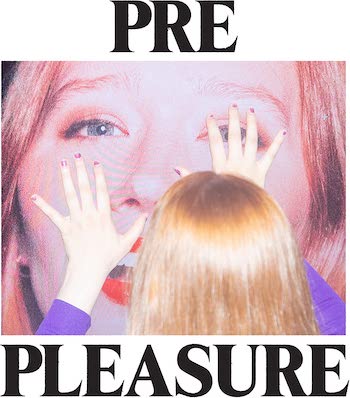Rock Review: Julia Jacklin’s “Pre Pleasure” — Posing Questions
By Alex Szeptycki
Intimacy, whether physical or emotional, is continually challenged in Julia Jacklin’s Pre Pleasure.

Julia Jacklin’s Pre Pleasure begins with the singer in Catholic School: “Seated in rows, knees and eyes closed I felt pretty/In the shoes and the dress, confused by the rest, could he hear me?” The album’s opening track, “Lydia Wears a Cross,” vividly details the scene by way of a breathless flow of couplet verses that namedrop Sunday school staples Jesus Christ Superstar and Joseph and the Amazing Technicolor Dreamcoat. In each refrain, Jacklin can’t conceal her unease, singing “I’d be a believer, if it was all just song and dance.” Doubt undermines the ritual and worship, even though her vision is nostalgia-tinted.
This introduction presents the album’s thematic center. Catholic imagery and repression crash against Jacklin’s emotional and physical desires. “I’ve been trying to be turned on by you,” intones the Australian singer/songwriter over the muted drums and keys of “Ignore Tenderness.” Jacklin continues to chase this feeling “watching porn, lights off headphones on,” But she finds herself repressing her desires: “When pleasure begins, my education creeps in.”
Intimacy, whether physical or emotional, is continually challenged. “Magic” serves as a counterpoint to “Ignore Tenderness.” On it, Jacklin sings “Forget all I learnt tonight/All the times that I’ve been hurt tonight/Remember what I’m worth and fight for it.” Her voice is backed by a string ensemble, which lends a baroque authority to the words. Jacklin closes the song with a quiet declaration: “For my final trick/I’ll ask if we could wait/Until I feel safe again.” Even when she’s secure and comfortable, Jacklin never stops grappling with her inner conflicts.
Emotional intimacy always feels just as out of reach. “Less of a Stranger” shifts the album’s attention to Jacklin’s relationship with her mother. Accompanied only by soft acoustic strumming, her voice is breathy and mournful as she intones “Don’t want to pick apart, or rearrange her/I just wish my own mother was less of a stranger.” The song plays out as a heartfelt dirge for a relationship that could have been.
Jacklin’s strong writing ties these psychological threads together, guiding the listener through her narrative. Scenes are set out in concrete detail before they are deconstructed via the turn of a phrase. Take “Moviegoer,” a track where Jacklin briefly diverges from autobiography into cinematic fantasy. Over drab, snail-paced guitars, Jacklin sets a vivid scene: “It opens with a wide shot/the scene is bare, dry, and hot,” runs the lyric. The tune weaves vignettes of loneliness together, connecting characters via their solitude. “Moviegoer’s forty dollars down, nobody from work invites them round for dinner/Movie director’s going down too, forty million dollars, still nobody loves you.”
Brief detours from the uncertainty only add to the central narrative strength of Pre Pleasure. The penultimate track “Be Careful With Yourself” supplies a rare note of triumph. “Please stop smoking, want your life to last a long time/If you don’t stop smoking, I’ll have to start, shorten mine,” implores Jacklin. She’s finally saying all the things that have been bottled up throughout much of the album: “I’m making plans for my future, and I want you in it.” Screeching guitars and backing “ahhs” rise to respond, throwing weight behind Jacklin’s admissions.
“End of a Friendship,” however, serves as a devastating counterpoint. A friendship promises to become something more, before it shatters as Jacklin watches on powerlessly. “She listed the things about me she didn’t like/I sat there in silence, accepted our fate.” The song drips with sorrow over slow, weighty guitar hits and percussion that barely seems to be there. The violin solo that makes up the bridge drives home a swoony edge to this song of loss. “All my love is spinning around the room/if only it would land on something soon.” There’s a yearning for intimacy here, though it remains tragically unfulfilled.

Julia Jacklin performing in 2017.
As an artist, Pre Pleasure shows that Jacklin has grown in her adroit use of instrumental backing. The stories in her songs have always been potent, but now the music both amplifies and strengthens the emotional force of the narratives. The meandering piano riff on “Love, Try not to Let Go” mirrors Jacklin’s vocals as she sings “Love, love is all that I want now.” And, on the chorus, the track suddenly shifts to a harrowing, distorted buildup, its pace matching Jacklin’s strained delivery.
“I was Neon” offers another approach to texture. The guitars growl softly, providing a steady foundation under the singer’s airy delivery. “Am I gonna lose myself again? I quite like the person that I am,” wonders Jacklin. She is answered by a simple but effective guitar solo. Her question becomes the song’s mantra, its repetition reinforcing Jacklin’s uncertainty as she grapples to find an answer.
These instrumental flourishes pop up across the album. They cut against a minimalist monotony that afflicts the efforts of many ambitious singer-songwriters. The desire to spotlight the vocal performance ends up back-firing: stripping back the accompaniment often results in a lackadaisical sameness. That is mostly avoided here. That said,“Too In Love to Die” fails because of its plodding, shapeless sound. But it is one of few blips on an otherwise solid disc.
Pre Pleasure succeeds because it presents a cohesively dramatic story. Familiar themes crop up again and again, setting the stage for Jacklin to move onto yet another stage in her struggle. By the time the album ends, the singer has chronicled considerable grace under psychological pressure. The album does not supply a happy ending; instead, it suggests that Jacklin’s struggle will continue long after the final song ends.
Alex Szeptycki is a writer from Charlottesville, VA. He recently graduated from Stanford University, majoring in American Studies with a focus in contemporary art and pop culture. He’s currently working as a freelance writer at the Arts Fuse while navigating post-grad life in a pandemic.
